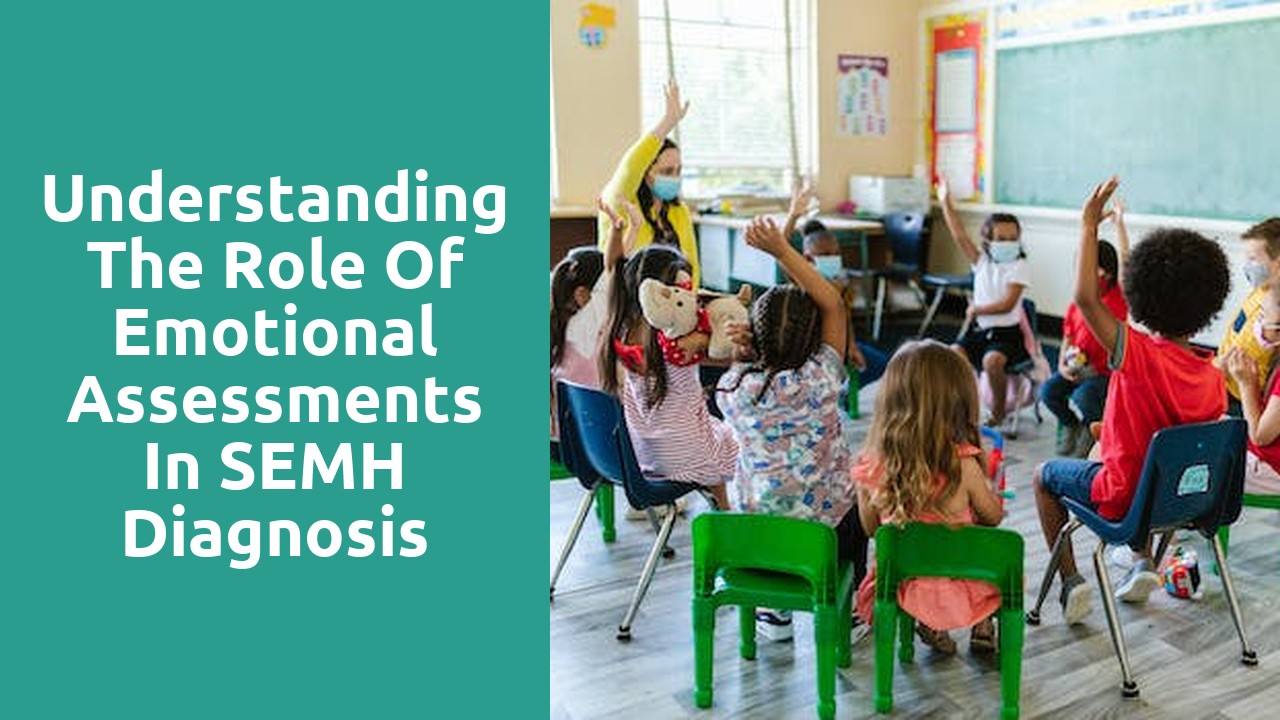

Emotional assessments play a crucial role in the diagnosis of Social, Emotional, and Mental Health (SEMH) conditions. These assessments help uncover the intricate connection between emotions and mental well-being, shedding light on the underlying challenges faced by individuals. By evaluating emotional well-being, professionals can identify the root causes of SEMH issues and provide accurate diagnoses.
Emotional assessments offer a comprehensive understanding of an individual's emotional intelligence, allowing for a deeper analysis of their emotional strengths and weaknesses. This knowledge is essential for effective SEMH diagnosis, as it helps professionals tailor treatment and support strategies to address specific emotional challenges. Furthermore, emotional assessments provide insights into the impact of emotions on an individual's overall mental health, enabling a more holistic approach to SEMH treatment. By recognizing the importance of emotional assessments, we can improve the accuracy of SEMH diagnoses and enhance the effectiveness of treatment interventions for individuals experiencing emotional difficulties.
When it comes to understanding mental health, it is crucial to uncover the connection between emotions and its impact on individuals. Emotions play a significant role in shaping our thoughts, behaviors, and overall well-being. It is through emotional assessment that we can gain a deeper insight into a person's mental health status.
Emotional assessments allow us to explore the range of emotions an individual experiences, as well as the intensity and frequency of these emotions. By evaluating emotional patterns, we can identify potential triggers and underlying factors contributing to an individual's mental health challenges. This information is essential in developing effective treatment plans and providing appropriate support and interventions to individuals struggling with mental health disorders. Understanding the connection between emotions and mental health is a crucial step towards fostering emotional well-being and promoting overall mental wellness.
Evaluating emotional wellbeing is a crucial aspect of diagnosing Social, Emotional, and Mental Health (SEMH) conditions. Understanding the emotions experienced by individuals is key to comprehending their mental health state. Emotional assessments play a significant role in examining one's emotional wellbeing in SEMH diagnosis.
These assessments provide valuable insights into the emotional experiences and patterns of individuals, allowing mental health practitioners to identify potential challenges and develop effective treatment plans. Evaluating emotional wellbeing involves assessing a range of emotions, such as anxiety, depression, anger, and happiness, to gain a comprehensive understanding of an individual's mental health state. This process helps in pinpointing specific emotional triggers and patterns that contribute to the development and maintenance of SEMH conditions. The findings from these assessments provide a solid foundation for building personalized interventions and support strategies that address the unique emotional needs of individuals with SEMH conditions.
Emotional assessments play a crucial role in identifying mental health challenges. By evaluating an individual's emotional state, professionals can gain valuable insights into their overall well-being and understand the root causes of their difficulties. These assessments delve beyond the surface and provide a deeper understanding of the person's unique emotional landscape, allowing for a more accurate diagnosis and more targeted treatment plans.
One of the key benefits of emotional assessments is their ability to uncover underlying emotional issues that may be contributing to mental health challenges. Many mental health conditions have a significant emotional component, and by assessing an individual's emotional state, professionals can identify patterns, triggers, and coping mechanisms that are impacting their mental health. This information can help professionals tailor appropriate interventions to address these emotional challenges and provide the necessary support to improve the individual's overall well-being.
Assessing Emotional Intelligence in SEMH Diagnosis
Emotional intelligence plays a crucial role in understanding and evaluating the emotional well-being of individuals with social, emotional, and mental health (SEMH) challenges. By assessing emotional intelligence, mental health professionals can gain deeper insights into a person's ability to recognize, understand, and manage their emotions effectively. This assessment goes beyond simply evaluating an individual's IQ and looks at their ability to navigate and adapt to a range of emotions in various situations.
One key aspect of assessing emotional intelligence in SEMH diagnosis is the evaluation of an individual's self-awareness and self-management skills. This involves measuring their level of emotional awareness, the ability to identify and label emotions accurately, and the capacity to regulate and control emotional responses. Understanding these components of emotional intelligence helps professionals in establishing a comprehensive profile of an individual's emotional well-being, which in turn aids in making accurate diagnoses and developing appropriate intervention strategies.
Understanding the Impact of Emotional Assessments on SEMH Treatment
Emotional assessments play a crucial role in the treatment of social, emotional, and mental health (SEMH) challenges. By evaluating an individual's emotional well-being, clinicians are able to gain a deeper understanding of the underlying issues that contribute to their SEMH difficulties. This understanding allows for a more personalized and effective approach to treatment.
One of the key impacts of emotional assessments on SEMH treatment is the ability to identify and address specific emotional challenges that may be hindering progress. Emotional assessments help to uncover underlying emotions such as anxiety, depression, anger, or fear that may be acting as barriers to recovery. By addressing these emotions directly, clinicians can work with individuals to develop coping strategies that are tailored to their unique emotional needs. The result is a more comprehensive treatment plan that addresses both the symptoms and the root causes of SEMH difficulties, leading to greater long-term success.